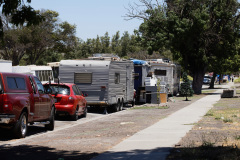Silicon Valley’s $250 million answer to the homelessness crisis?

With pandemic unemployment and eviction protections ending this month, the CEO of one of Silicon Valley’s biggest homeless services nonprofits is calling on corporate leaders to step up in a big way — by ponying up $250 million to open 10 emergency housing sites.
The call to action underscores a question that’s become especially urgent in the face of the COVID crisis: What responsibility do the region’s tech companies have to address the dire problem of homelessness in their own backyards?
Seattle-based Amazon recently became the latest tech titan to take up the cause, donating $100,000 to support New Haven Inn — a homeless shelter for LGBTQ+ residents in downtown San Jose. Facebook this week announced it has invested nearly $40 million to build almost 500 homes from Sunnyvale to the East Bay, the majority of which will be reserved for residents at the lowest rung of the socioeconomic ladder, or who were homeless.
Aubrey Merriman, CEO of homeless shelter provider LifeMoves, is trying to tap into more of the region’s corporate wealth by convincing other companies to join the fight.
“There’s only so many Teslas and trips to space that you can have,” he said. “And really the legacy that you have is the opportunity to say that we were able to address one of the fundamental challenges of our lifetime.”
LifeMoves recently opened a 124-bed shelter in Mountain View unlike anything it’s ever done before. In contrast with traditional shelters where people sleep together in dorm-like rooms, the new site gives each individual or family a private room in a modular unit — the units are assembled almost like a “Legoland community,” Merriman said. The $25 million project took six months and used $14.35 million in state Homekey funds — money allocated to help cities and counties create homeless housing during the pandemic — plus contributions from Santa Clara County, the city of Mountain View, Google and LinkedIn.
The goal is to shelter people there for up to about four months before moving them into permanent housing.
By building 10 more of these modular sites, LifeMoves could help nearly 20,000 people transition out of homelessness over the next five years, Merriman said.
“We’re just waiting for that first company to grab the flag and wave it and say ‘we’re here and we’d like to get others to join us,’” Merriman said.
Tech companies have shown increasing interest in the affordable housing crisis over the past few years. Since launching its TECH Fund in 2017, Housing Trust Silicon Valley has raised $117 million from local companies for affordable housing. Google in March announced nearly $30 million in loans for three new Bay Area developments.
But support has been slower for shelters and other emergency solutions specifically for homeless individuals.
Amazon, which previously had committed more than $2 billion to fund housing in Washington, Virginia and Tennessee, recently dipped its toes into the Bay Area crisis with its donation to the San Jose shelter.
“While only governments at the local, state and federal level have the capacity to implement more effective housing policies, we believe the private and public sectors can and should work together to address this challenge,” Sally Kay, Amazon’s senior manager of external affairs in Northern California, wrote in an emailed statement. “We support innovative housing affordability initiatives in communities where our employees live and work and where we believe our financial support will make a difference.”
The company chose New Haven Inn because it got involved with Silicon Valley Pride in August, and wanted to make a donation to benefit the LGBTQ community, according to Kay.
Apple meanwhile recently pledged to spend millions of dollars to help relocate and provide services for dozens of people living in a sprawling encampment on the tech titan’s vacant San Jose property.
Facebook last year promised to invest $150 million in Bay Area affordable housing projects. On Wednesday, the company unveiled the first four projects that will kick off its new fund: two in San Jose, one in Sunnyvale and one in the East Bay. Another two projects are expected by the end of 2021 — which would bring Facebook past its goal of backing five buildings in the fund’s first year.
The money Facebook is investing pays for the very first step of the development process — buying the land and planning the construction — which is often the most challenging step, said Ray Bramson, chief operating officer for Destination: Home, which is working with Facebook on the projects. Government funds often aren’t earmarked for that stage of the process, and traditional lenders may find that early step too risky, he said. That’s why tech companies, with deep pockets and a high tolerance for risk, are in an ideal position to supply that initial funding, Bramson said.
“These businesses are part of our community,” he said. “And homelessness and the lack of affordable housing is a community problem, and it really requires a community solution.”

